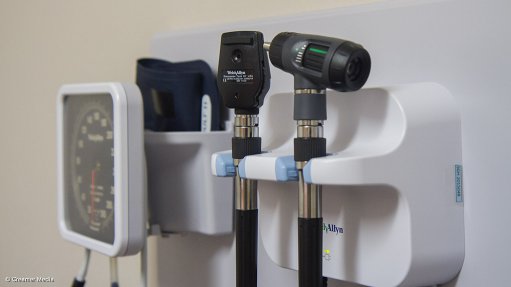
ALTERNATIVE POLICY
An Economic Empowerment for the Disadvantaged policy would assist South Africans currently hampered by poor schooling, bad housing and a failing healthcare system
Photo by: Duane Daws
Government’s predilection for black economic-empowerment (BEE) policies, which will be intensified should the new Mining Charter be implemented, will never achieve proper empowerment and transformation in the mining industry, posits research and policy organisation South African Institute of Race Relations (IRR) head of policy research Anthea Jeffery.
Instead, she believes that these BEE policies will impede the industry, making it vital that alternative means to improve transformation be relentlessly pursued.
Jeffery indicates that fulfilling transformation targets is already a challenging endeavour, with the third iteration of the Mining Charter compounding the difficulties by elevating transformation targets to impossibly high and costly levels. These will reward only a small number of BEE-connected shareholders because of the way BEE policies are generally practised – operating mainly as a tax on investment and an attempt to extract wealth for the benefit of a small political elite, she adds.
Moreover, the charter will reduce the capacity of mining to achieve the successes within its reach, limit its scope to employ more people and render many mining ventures ‘uninvestable’. Therefore, Jeffery says the charter will cause great harm to not only the industry but also the economy and that, without growth and investment, mining’s scope to contribute to genuine empowerment will be slim.
As long as the existing transformation agenda is retained, she states, the country will be unable to attract the investment needed to fulfil most South Africans’ aspirations for a better life.
“The country needs a bold new approach, which emphasises growth and expanding opportunities for the truly disadvantaged.”
Jeffery highlights that the IRR has devoted considerable energy to crafting an alternative transformation policy, called Economic Empowerment for the Disadvantaged (EED), following thorough examination and explanation of the risks in current policy. “We believe that the EED policy would stimulate investment and growth while greatly increasing the scope for genuine empowerment.”
She explains that the EED policy entails introducing a scorecard on which mining companies would earn voluntary points for capital invested, minerals produced, profits earned, dividends declared and contributions made to tax revenues, export earnings and research and development spending. Points will also be allocated for jobs provided and safety and environmental standards upheld.
“These contributions to empowerment are the most important ones that mining companies can make. Without these fundamentals, the most impenetrable barriers to upward mobility – low growth and high unemployment – can never be overcome.”
Moreover, she indicates that the EED policy would provide practical assistance for those currently hampered by poor schooling, bad housing and a failing healthcare system. A large sum of revenue is spent by the State on these aspects, but mainly ineffectively, thereby producing “dismal” results. By redirecting much of this revenue into tax-funded vouchers to be supplied directly to poor families, this can be solved, says Jeffery.
She explains that, through this initiative, parents would be empowered with tax-funded school vouchers worth about R20 000 a child. This would allow parents and learners the freedom to pick their school of choice, which would require schools to compete for their custom. This competition will compel improvements in failing State schools, create more independent schools to satisfy burgeoning demand and lower costs while raising the quality of education – as evidenced by school vouchers in Denmark, Sweden, the Czech Republic, Chile, Colombia, Guatemala and some cities in the US.
Similarly, tax-funded housing vouchers will empower the poor to start building or improving their own homes, rather than depending on government to deliver housing. Tax-funded healthcare vouchers will enable people to join low-cost medical schemes or take out health insurance policies, which will lessen their reliance on often subpar public facilities, Jeffery states.
The EED scorecard will also reward mining companies for their voluntary contributions in these three domains, giving them extra points for topping up vouchers in mining communities or helping to improve the quality of provision in these spheres.
Jeffery enthuses that the policy would, thus, bring about wide-ranging and genuine empowerment for the benefit of the many, rather than the few. Moreover, this approach could be extended well beyond the mining industry, with measurable positive impacts across the entire society. She compares the EED with current policies, which are putting the mining industry and wider economy at further risk, effectively denying millions any genuine chance of a better life.
“Policy choices are becoming stark. The country can continue with BEE policies in mining (and beyond) and reap the bitter harvest that will surely follow or South Africans can grasp the policy nettle by recognising the failures of BEE and insist on a shift to the EED policy.”
Jeffery informs Mining Weekly that the IRR uses every opportunity to spell out the advantages of adopting a genuine empowerment model such as the EED. The organisation uses high-level briefings, engagements with political parties and contributions to the public debate to promote new thinking.
The IRR also considers it a vital part of its mandate to reinforce political and economic freedom by sharing with the public – and the electorate – the plethora of data it collates on the implications of policy. This enables individuals, businesses, policymakers and political parties to make informed choices that are genuinely aligned with the national interest.
Jeffery cites a representative opinion survey commissioned by the IRR in 2016, which offers valuable insight. This survey indicates that 75% of the 2 291 South Africans surveyed (including 73% of black respondents) regard ‘more jobs and better education’ as the best way to improve people’s lives, while only 3% think people’s lives could best be improved through ‘more BEE and affirmative action in employment policies’.
She also highlights that more than 80% of participants said they would prefer State-funded vouchers to gain access to sound education, healthcare and housing, and the upward mobility these benefits would help provide.